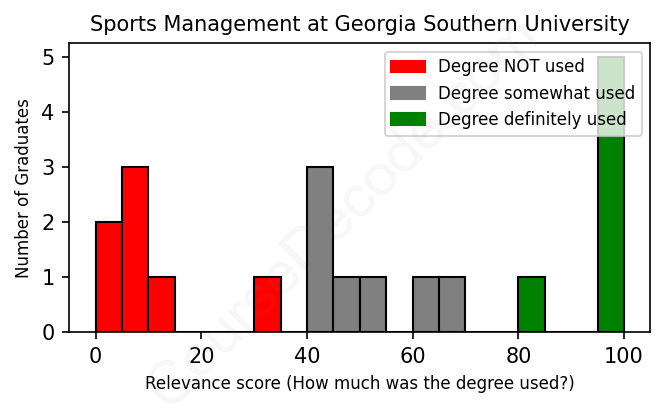
First, some facts. Of the Sports Management graduates from Georgia Southern University we've analyzed , here's how many have used (or NOT used) their degree in their career:

These are estimates based on AI analysis of 20 LinkedIn profiles (see below).
The verdict? Significantly below average. Overall, with an average relevance score of 49%, Sports Management graduates from Georgia Southern University have a much lower likelihood (-18%) of finding work in this field compared to the average graduate across all fields:
And for comparison, here's the chart for all profiles we've looked at across all degrees.
Also, after graduating, only 25% of these graduates have pursued further education other than another Bachelor's degree (such as a Masters degree or other), compared to the average across all profiles of 35%. This suggests a Bachelors degree is enough for most Sports Management graduates, and it's normal to look for work straight after graduation.
See the details:
|
Relevance score: 64% We think this person has gone into a career only somewhat relevant to their degree. We think this person has gone into a career only somewhat relevant to their degree.
DEGREE INFOGraduated in 2015 from Georgia Southern University with a Bachelor of Science (BS) in Sports Management. No other secondary education since. JOB HISTORY SINCE GRADUATIONSales Associate Troon Jan 2015 - May 2016 Management Trainee  Troon Jun 2016 - Dec 2016 Human Resources Coordinator  Troon Feb 2017 - Apr 2017 Accounting  Troon Dec 2016 - May 2017 Supervisor  Troon May 2017 - Aug 2017 Assistant Manager  Troon Sep 2017 - Jan 2019 Manager  Troon Jan 2019 - May 2021 Manager  Aronimink Golf Club May 2021 - Jul 2023 Purchasing Agent  Aronimink Golf Club Jul 2023 - Present ABOUTExperienced management professional with over nine years of experience, and a proven track record of customer satisfaction. I am passionate about helping my team members improve on their individual performance, and the teams overall results. I believe that ultimate success is when a team member is operating at the highest levels of production combined with them experiencing the highest level of job satisfaction. |
The top 10 most common jobs done by the graduates we've analyzed (ranked most common to least) are:
When looking at the job paths of individuals who studied Sports Management at Georgia Southern University, there seems to be a mixed bag of career choices. Many graduates ended up in roles that aren’t directly connected to sports—like therapists, retail managers, or insurance specialists—which makes it seem like they strayed from the field. It’s a bit surprising, especially since these folks invested their time and money into a degree that is supposed to open doors in the sports world. For some, like the alumni who interned with the golf association or worked in ticket operations, their jobs are right on point with their studies, demonstrating solid applications of their Sports Management knowledge.
However, the majority of these job roles don’t make direct use of their sports management education. Positions like sales associates or administrative roles, while they might have some overlap in soft skills like teamwork and communication, really don't tap into the core competencies that you'd expect from a Sports Management degree. It's clear that while some graduates found relevant positions deeply rooted in their field—like event coordinators or athletic directors—others seemed to drift into various roles that could have been filled by anyone, regardless of their academic background. So while some graduates are really utilizing their degrees well, a good number are working in jobs that don’t align with what they studied, which is a bit of a bummer if you’re looking to work in the exciting world of sports.
Here is a visual representation of the most common words in job titles for Sports Management graduates (this is across all Sports Management graduates we've analyzed, not just those who went to Georgia Southern University):

Looking at the career trajectories of Georgia Southern University graduates in Sports Management, it seems like they start off their careers with a variety of entry-level jobs that might not always directly relate to sports. Many graduates land internships in event management or work in roles at sports facilities, but it's pretty common to see them branching out into different fields initially. For example, some have taken up roles in marketing, retail management, or even gone into areas like counseling and human resources. That suggests that while they might have a passion for sports management, they often explore a wide range of opportunities before firmly sticking to their roots.
Fast forward a few years, and you start to notice a clearer alignment with sports management for many of them. Those who took internships in sports teams or events tend to climb the ladder within those organizations, moving into roles like event coordinators or ticket operations managers. Others who started in more generalized fields often find a way back to sports, like taking management roles in athletic organizations or working for universities' athletic departments. This shows that while the early years can be a bit scattered, there's definitely a trend for graduates to circle back to their sports management roots as they gain experience. Overall, it seems like the long-term outlook is positive for those who stick with it and find their niche in the sports world!
A Bachelor’s degree in Sports Management, including the program at Georgia Southern University, is generally considered to be on the easier side compared to some other majors, but that doesn’t mean it’s a walk in the park. You’ll find that a lot of the coursework is pretty relatable if you’re already into sports, covering topics like marketing, finance, and event management all within a sports context. That said, there are definitely some challenges, especially when you hit more rigorous classes or have group projects that require teamwork. If you're passionate about sports and willing to put in the effort, it can be a fun and engaging journey—just don’t go in expecting it to be all fun and games!
Most commonly, in the LinkedIn profiles we've looked at, it takes people 4 years to finish a Bachelor degree in Sports Management.
So, when you look at the career paths of these Georgia Southern graduates, it’s kind of a mixed bag in terms of earnings. The folks who graduated earlier generally seem to have landed in some decent roles—like therapists and account managers—which can pay pretty well, especially with experience. Meanwhile, later grads are still on their way up the ladder, with a bunch starting in roles that don't scream "big bucks" right off the bat, like internships or entry-level positions. Some do switch to managerial roles as they gain experience, which can definitely lead to better pay, but it’ll take time. Overall, while some are probably making solid salaries, others are still grinding it out and building their careers, so it really varies depending on their individual journeys.
Here is a visual representation of the most common words seen in the "about" section of LinkedIn profiles who have a Bachelor degree in Sports Management (this is across all Sports Management graduates we've analyzed, not just those who went to Georgia Southern University). This may or may not be useful:

Here are all colleges offering a Bachelor degree in Sports Management (ordered by the average relevance score of their Sports Management graduates, best to worst) where we have analyzed at least 10 of their graduates: